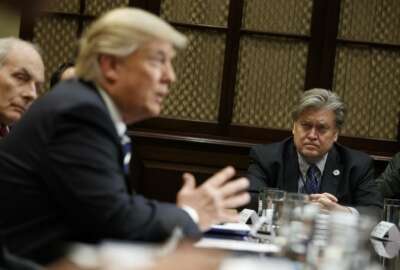
2 senators ask for GAO review of Trump hiring freeze
Sens. Heidi Heitkamp (D-N.D.) and Gary Peters (D-Mich.) asked that the Government Accountability Office to conduct a full review of President Donald Trump's...
Two senators want the Government Accountability Office to conduct a full review of President Donald Trump’s temporary hiring freeze.
Citing previous GAO studies on the hiring freezes from the Carter and Reagan administrations, Sens. Heidi Heitkamp (D-N.D.) and Gary Peters (D-Mich.) said they’re concerned the same problems agencies experienced during past freezes will reappear again.
“While we applaud efforts to streamline government, ensure efficient operations and encourage good stewardship of taxpayer dollars, we are extremely concerned about the potential for increased government spending and waste under this freeze,” the senators wrote in a Apr. 4 letter to Comptroller General Gene Dodaro.
Heitkamp and Peters are the ranking members of the Senate Homeland Security and Governmental Affairs subcommittees on regulatory affairs and federal management and on federal spending oversight and emergency management, respectively.
GAO last studied federal hiring freezes in 1982. In its report, GAO said four across-the-board freezes were ineffective in managing federal employment, and it’s unclear whether they saved government any money.
“Because they ignored individual agencies’ missions, workload and staffing requirements, these freezes disrupted agency operations, and in some cases, increased costs to the government,” GAO said in 1982.
Heitkamp and Peters are also concerned that agencies may use contractors to circumvent staffing shortages, despite language in Trump’s executive memo that states departments may not hire new contractors during this time.
“The language is almost identical to the language in the Carter and Reagan freezes, which was disregarded by certain agencies that encountered staffing challenges,” the senators wrote. “Additionally, research has shown that staffing shortages provide incentives for agencies to increase its contracting.”
Both senators are also worried what impact the hiring freeze may have on agencies’ ability to meet customer service priorities.
“GAO found that past governmentwide hiring freezes hindered agency missions, caused inefficient staff utilization and clerical shortages and resulted in lost revenue and uncollected debts,” they said. “This freeze could also negatively affect the talent and morale of our workforce.”
Heitkamp and Peters cited all of these concerns in their letter and asked that GAO examine the following issues in a new study:
- Whether contractors picked up work that federal employees did in the past and costs associated with those services.
- The historical and projected size of the federal workforce and if the freeze resulted in savings or losses.
- The impact of the freeze on agencies’ budget, mission programs, customer service, workload, morale, retirement or other employment activities.
- A review of the guidance that the Office of Management and Budget and Office of Personnel Management issued to agencies before, during and after the freeze.
- Lessons learned from the current and previous hiring freezes and what downsizing efforts agencies can use in the future.
Heitkamp and Peters are not the first lawmakers to express their worries. Several members of Congress introduced a handful of new bills that propose specific exemptions to the hiring freeze.
Trump authorized the temporary freeze in a Jan. 23 executive memo , one of his first moves as president. The freeze is in place until OMB develops a long-term plan to cut the size of the federal workforce through attrition.
Agencies, in addition to the Office of Personnel Management, have exempted many positions from the hiring freeze.
OMB issued a long list of exemptions to the freeze. In addition, the Pentagon initially ordered 16 specific exemptions.
OPM has granted at least three specific exemptions, including administrative law judges and processing center employees at the Social Security Administration.
The Veterans Affairs Department exempted more than 100 different positions, which cover mostly health care professionals, construction, contracting and project management positions, some burial and memorial service employees, veterans benefits processors and some cybersecurity professionals.
Roughly 54,000 civilian employees at the Air Force have been exempted. The Army said it developed a process to fast-track exemptions from the hiring freeze. The service has exempted at least 20,000 new positions as of March 15.
Copyright © 2024 Federal News Network. All rights reserved. This website is not intended for users located within the European Economic Area.
Nicole Ogrysko is a reporter for Federal News Network focusing on the federal workforce and federal pay and benefits.
Follow @nogryskoWFED
Related Stories





